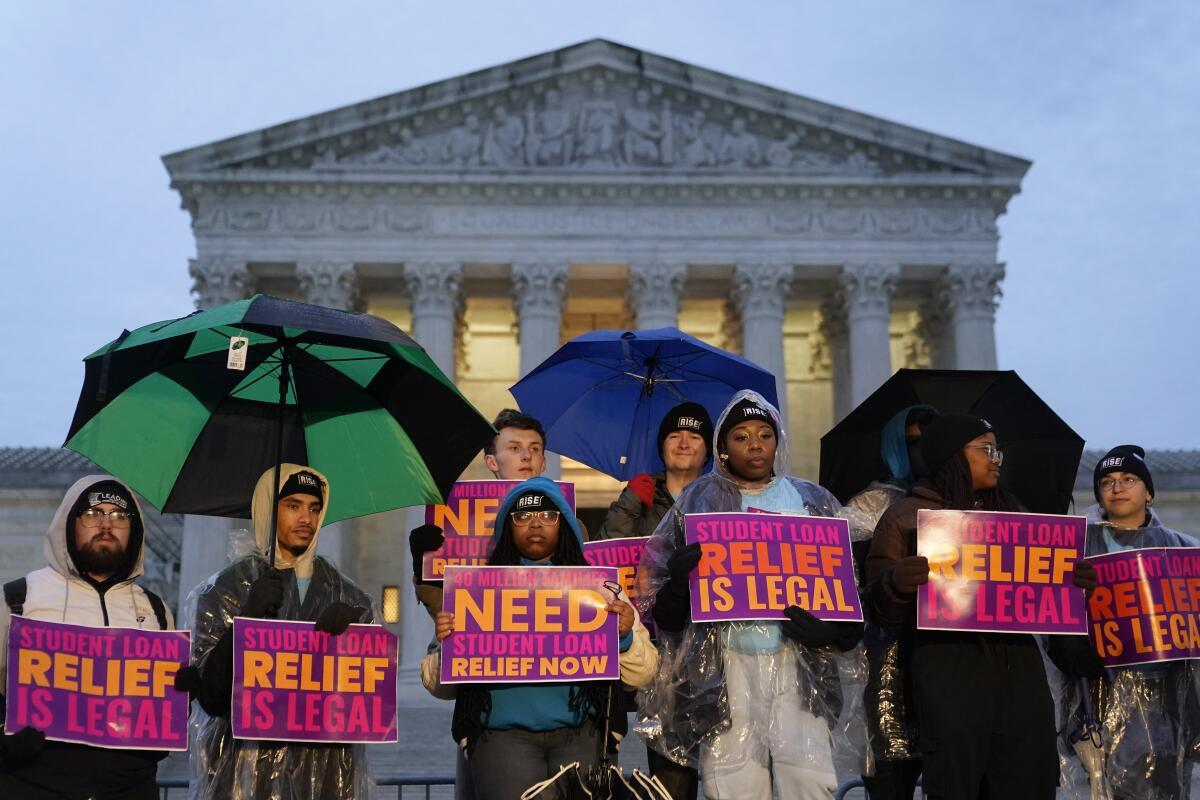The Supreme Court rewrote the law so that it could stop student loan forgiveness

- Share via
In striking down the Biden administration’s student loan forgiveness program, the Supreme Court ignored one of the most basic principles of law: When the text of a law is clear, it must be followed unless it is unconstitutional.
A federal statute, the Higher Education Relief Opportunities for Students Act of 2003 (HEROES Act), explicitly authorizes the Secretary of Education to “waive or modify” student loan obligations. That is exactly what President Biden did in his loan forgiveness program, but the court, ruling 6-3, decided that he lacked authority under the law to take this step, which would have helped more than 40 million people.
In the early days of the COVID pandemic, then President Trump used the authority under this statute to suspend the need for most borrowers to repay student loan obligations. Biden, on taking office, continued this relief. He then made it permanent, providing up to $20,000 of forgiveness of student loans for those who qualified.
Two lawsuits were filed challenging this action. One was brought by two individuals who did not qualify for relief under the Biden program. The Supreme Court unanimously found that they lacked standing to sue because striking down the Biden program would not benefit them.
The other lawsuit was brought by Missouri and five other conservative states. As Justice Elena Kagan wrote in dissent, none of these state governments would suffer any injury from the Biden student loan forgiveness program. In fact, just last week, the Supreme Court ruled that Texas and Louisiana lacked standing to challenge the Biden administration’s change in immigration policy. The court in that immigration law case said that a state cannot sue the federal government just because of an ideological disagreement with the president’s policies.
Based on that principle, the court should have thrown out Missouri’s suit as well. Yet Chief Justice John G. Roberts Jr., writing for the conservative majority, said the state could sue even though Missouri itself would suffer no costs from the Biden program. Another public agency, the Missouri Higher Education Loan Authority — which is legally and financially independent from the state — would incur some costs, but those costs don’t affect the state treasury. And that agency was not part of the lawsuit.
The court said that did not matter. Instead, Roberts invoked the “major questions doctrine,” the principle that a federal agency cannot act on a major question of economic or political significance unless it has clear direction from Congress. Roberts said whether the Secretary of Education can give this loan relief is a major question and that Congress was not sufficiently specific in authorizing such relief.
But the statute says the secretary of education has authority to “waive or modify” student loan obligations. It is the heart of the law, and hard to imagine clearer language than that.
In the striking down the Biden administration’s action, the court ignored the statute’s plain language. If Congress wants to rewrite the law because it doesn’t like the Biden relief, it can do so, but that’s not the role of the court.
More broadly, the court’s reliance on the “major question” doctrine is hazardous. Nowhere is “major question” defined, and by raising it in this case, the court opens the door for challenges to government regulations of all sorts, including health and safety and environmental regulations.
This would allow any party that doesn’t like a regulation to demand that it be struck down because Congress wasn’t sufficiently specific on that action. It gives courts the power to strike down executive actions that they don’t like, which is exactly what happened in this case. As Kagan wrote in her dissent: “The result here is that the Court substitutes itself for Congress and the Executive Branch in making national policy about student-loan forgiveness. Congress authorized the forgiveness plan (among many other actions); the Secretary put it in place; and the President would have been accountable for its success or failure.”
The real-world result is that more than 40 million people, who need debt relief, will not get it because this conservative court decided to reject a policy it doesn’t support.
Erwin Chemerinsky is a contributing writer to Opinion and the dean of the UC Berkeley School of Law. His latest book is “Worse Than Nothing: The Dangerous Fallacy of Originalism.”
More to Read
A cure for the common opinion
Get thought-provoking perspectives with our weekly newsletter.
You may occasionally receive promotional content from the Los Angeles Times.









